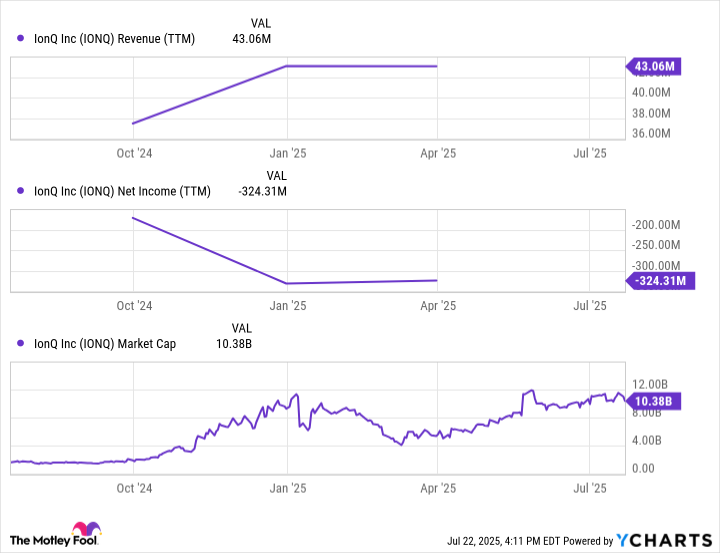When it comes to investing in quantum computing, growth investors have largely looked past mature artificial intelligence (AI) businesses such as the "Magnificent Seven" in favor of more speculative opportunities that could carry generational upside.
One company emerging as a fan favorite in the quantum computing arena is IonQ (IONQ 3.43%), whose shares have surged by a jaw-dropping 470% over the last year. With quantum technology estimated to be a trillion-dollar opportunity, I can understand why a hype narrative has formed around IonQ. But is it justified?
Let's explore the ins and outs of a bull and bear thesis around IonQ, and assess where the stock could be headed over the next five years.

NYSE: IONQ
Key Data Points
Why IonQ could be a big winner over the next 5 years
There are a number of emerging players alongside IonQ in the quantum computing arena. One way the company is differentiating itself from other popular players in the space, such as Rigetti Computing or D-Wave Quantum, is that IonQ is offering quantum applications as a service.
Instead of spending all of its time building expensive, capital-intensive supercomputers, IonQ allows customers to access quantum computing applications via cloud-based integrations with major hyperscalers, including Microsoft Azure, Amazon Web Services (AWS), and Google Cloud Platform (GCP).
Offering quantum-as-a-service (QaaS) as an integration with major cloud infrastructure providers can theoretically help IonQ gain a distribution edge over its smaller peers.
Quantum computing could witness significant interest thanks to rising AI infrastructure spend from large enterprises over the next several years. As a result, IonQ appears well-positioned to ride these tailwinds as quantum applications scale and become more widely adopted.

Image source: Getty Images.
How realistic is the bull case above?
Microsoft, Amazon, and Alphabet are each developing their own custom quantum computing chips -- known as Majorana, Ocelot, and Willow, respectively. Although IonQ's QaaS offering serves as a platform on which companies can experiment with quantum computing, I think its services will be jettisoned by big tech as they further develop their own internal quantum systems.
So while IonQ's partnerships with big tech might look impressive on the surface, I think they are more symbolic than truly distinct or disruptive at this stage.
Where will IonQ stock be in 2030?
Over the past year, IonQ has generated $43 million in sales and posted net losses in excess of $300 million. Despite being nowhere near profitability, IonQ's market capitalization has skyrocketed to more than $10 billion as of this writing.
IONQ Revenue (TTM) data by YCharts.
Speaking purely in terms of valuation, IonQ is trading far beyond what could be seen as a bubble stock. Given the rising competitive threat from big tech and an arguably unsustainably overstretched valuation, I see two fitting outcomes for IonQ stock over the next five years.
On the one hand, the company's QaaS platform stands out and could very well help IonQ carve out some distinct use cases in areas such as academia, or remain within the hyperscaler ecosystems for specific needs. As such, I could see IonQ still operating by 2030 -- but with the caveat that its growth would be fairly limited, and that the stock would trade at a more appropriate valuation than where it is today.
In contrast, the hyperscalers may choose to parlay their custom chip designs to build an end-to-end quantum business with hardware, software, and services all packed tightly into their cloud ecosystems. This would make partnerships with external providers less valuable.
In a scenario like this one, I could see IonQ suffering a precipitous sell-off from which it never recovers -- ultimately becoming a delisted stock. More realistically, however, I think IonQ could wind up as an acquisition candidate among big tech. Again, the caveat would be that the company is acquired at a discount to where it is trading today. IonQ's current valuation profile is incongruent with the underlying financial picture and business results.
In either case, I think IonQ will be trading for a far lower price in 2030 compared to where it is now. For this reason, I'd pass on investing in IonQ at its current price point.






